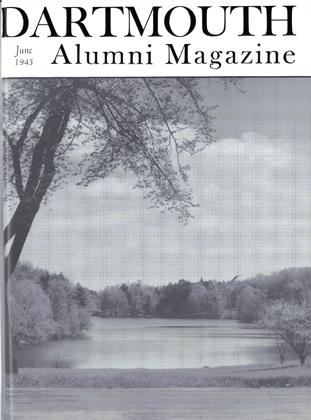by Richard £. Lauterbach *35. Harper & Brothers, 1945, 368 p.,
This is an interesting, well written and, on the whole, fair-minded account of Russia at war. The author was Moscow correspondent for Life and Time in 1943-44. He visited many liberated Russian cities, the Polish front, and went with Eric Johnston's party on a tour of the industrial centers in the Urals and Central Asia. Mr. Lauterbach found a great many things to admire in the Soviet Union—the leaders, of whom he gave some very vivid sketches; the successful development of the backward national groups in Central Asia; Soviet science, (one of the best chapters is devoted to scientific and medical research); the zest with which the reconstruction of liberated areas is going on; above all, he liked the friendliness, hospitality, and the social idealism of the Russian people. Evidently, the author was not disturbed (as was William L. White, who went on the same tour with Eric Johnston) by the absence of fundamental freedoms in the Soviet Union, by the everpresent NKVD agents, the high prices and the low standard of living, bureaucratic red tape, and the dirt and inefficiency in some of the plants he visited.
"Why was the war won"?—he asked and found the answer unhesitatingly in the leadership of the Communist Party: "When Hitler struck, it was the cement which held together all the bricks in Stalin's fortress." Rightly, I believe, Mr. Lauterbach considers the prodigious growth of the Communist Party as the most significant development in wartime Russia. Collaboration with Russia, he concludes, is not only possible, but essential.
 View Full Issue
View Full Issue
More From This Issue
-
 Article
ArticleDARTMOUTH'S RIVER
June 1945 By Alice Pollard -
 Article
ArticleLaureled Sons of Dartmouth
June 1945 By H. F. W. -
 Article
ArticleFOR MILITARY TRAINING
June 1945 -
 Class Notes
Class Notes1918
June 1945 By ERNEST H. EARLEY, DONALD L. BARR -
 Class Notes
Class Notes1945
June 1945 By ARTHUR NICHOLS -
 Class Notes
Class Notes1908
June 1945 By LAURENCE SYMMES, WILLIAM D KNIGHT, ARTHUR BARNES
Dimitri Von Mohrenschildt
Books
-
 Books
BooksAlumni Articles
JANUARY 1965 -
 Books
BooksBriefly Noted
JANUARY 1967 -
 Books
BooksDEVIL BY THE TAIL
May 1947 By Herbert F. West '22 -
 Books
BooksSome Healthy, Some Lethal
October 1975 By ROBERT E. GOSSELIN -
 Books
BooksTHE ENGLISH BIBLE AS LITERATURE
April 1931 By Roy Bullard Chamberlin -
 Books
BooksSorting Out the Roses
OCT. 1977 By SAMUEL M. PRATT '41


